Papers by Gustavo Lins Ribeiro
La historia de la construcción de Brasilia (1957-60) desde la perspectiva de los trabajadores. Re... more La historia de la construcción de Brasilia (1957-60) desde la perspectiva de los trabajadores. Republicada en la colección Clásicos Recuperados de CLACSO.
DESACATOS, 2021
The 2020 pandemic is seen as a critical event that descotidianizes, in an unprecedented way, the ... more The 2020 pandemic is seen as a critical event that descotidianizes, in an unprecedented way, the entire planet. The article is a map of the main social-political-economic structures, contradictions and (re) interpretations that COVID 19 brings into light. It is a cartography in process of the coronavirus’s impacts on social interactions, on the differentiated uses of real / virtual public spaces, on the increase of new hybridisms. I also consider how the critical event makes explicit: (a) the current intensity of glocal interconnections, including environmental ones; (b) inequality structures, (c) changes in the world system. Finally, some interpretative trends of the social sciences on the pandemic are presented. I conclude that without radical social and political changes there is no hope for a better future.
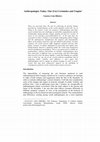
Indian Anthropologist, 2019
These are uncertain times. We may be witnessing an epochal change provoked by transformations of ... more These are uncertain times. We may be witnessing an epochal change provoked by transformations of the world capitalist system (the rise of China to the system's center, for instance). Anthropologists and other social scientists face new challenges as interethnic segmentations and the relationships among glocales change, igniting old and new racisms. It seems we are entering a post-multicultural era. At the same time, the conception of what is human is increasingly undergoing radical change and the anthropocene metaphorizes the negative and unsustainable effects of the human experience after the Industrial Revolution. In many countries, the social sciences suffer budgetary cutbacks and lose their public relevance in milieus dominated by post-truths and rightist anti-intellectualism. Internet's capillarity makes the world seem transparent and the intelligentsia meaningless. There is an urgent need to rethink our positionalities, subjects and politics of visibility. Anthropologists have been interested, in different ways, in intervening with their knowledge and research in how the future unfolds. I claim that thinking on a global scale is both one way out of our current political conundrums and of regaining public visibility and influence. I also argue that anthropologists need to engage in utopian struggles in order to foster visions that may have progressive impacts on the unfolding of contemporary political, social, cultural and economic processes.
The global/local tension in the history of anthropology
El Universal, 2020
Miedo Global
Me interesa comprender cómo los empresarios e innovadores de internet se han convertido en podero... more Me interesa comprender cómo los empresarios e innovadores de internet se han convertido en poderosos capitalistas. La mercantilización de las pala-bras, el mercado virtual global, la economía de la carnada y las economías del enlace, del clic y del me gusta son modos de producir ganancias, cruciales para entender el rápido crecimiento de algunas de las principales empresas del presente. también argumento que el googleísmo es para el capitalismo contemporáneo lo que fueron el fordismo y el toyotismo: modelos de geren-ciamiento de los factores de producción que se diseminan en todo el globo. La innovación masiva en línea o crowdsourcing se presenta como un modo de apropiarse de la creatividad en línea, básico para la (re)producción del capitalismo electrónico-informático.

What is in a copy? I will answer this question by considering the importance of the copy in three... more What is in a copy? I will answer this question by considering the importance of the copy in three related areas: academia, cultural life, and the economy. In academia, the ease with which copies can be made is challenging pedagogical practices and the trust of its members, with plagiarism being the most immediate problem. The notion of authorship is also undergoing changes provoked by a proliferation of authors and by possibilities opened recently by cyberspace. In cultural life, imitation and mimesis have long been fundamental engines of socialization. Our enhanced capacity of copying problematizes, with new intensity, the relationships between homogeneity and heterogeneity, between the genuine and the spurious. In the economic world, the digital era is threatening some of the fundamental tenets of capitalism, especially of its variant, the "knowledge society," which concerns the control of intellectual property rights. The gap between normativity and social practices is widening. The many dilemmas and tensions identified in this text are therefore understood as symptoms of two major characteristics of the current times: hyperfetishism and hyperanimism.
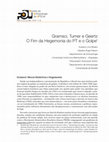
Desde sua Independência e proclamação da República o Brasil tem uma história política repleta de ... more Desde sua Independência e proclamação da República o Brasil tem uma história política repleta de golpes ou tentativas de golpes. A ditadura civil-militar de 1964-1985 espelhou a triste chegada ao poder de um bloco histórico, em termos gramscianos, da direita conservadora brasileira que tinha expressado seu apetite pelo poder nos episódios que levaram Getúlio Vargas ao suicídio em 1954 e na conspiração que visava a impedir a posse de Juscelino Kubitschek (1956-1961. Com uma transição à democracia, na década de 1980, sem responsabilizar os que romperam com a democracia e os direitos humanos, como fizeram os argentinos -certamente com a força moral que a derrota na Guerra das Malvinas (1982) concedeu aos civis democráticos -, um novo pacto brasileiro cristalizou--se na Constituição de 1988. Entretanto, as forças sociais, econômicas e políticas representadas pelos militares obviamente não desapareceram e continuaram com alto poder de fogo.
Palabras clave: transnacionalización, etnicidad, elites, tendencias, Banco Mundial. Nota: Agradez... more Palabras clave: transnacionalización, etnicidad, elites, tendencias, Banco Mundial. Nota: Agradezco a Larissa Adler Lomnitz, de la Universidad Nacional Autónoma de México, las correcciones a la traducción de este texto. Una versión previa fue publicada en Daniel Mato (comp.): Estudios latinoamericanos sobre cultura y transformaciones sociales en tiempos de globalización, Buenos Aires, Clacso, 2001, pp. 103-118.
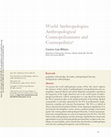
To present the world anthropologies project (WA), this article explores the existence of three ki... more To present the world anthropologies project (WA), this article explores the existence of three kinds of anthropological cosmopolitanisms and cosmopolitics: imperial, liberal, and radical. Imperial cosmopolitics reproduces the hegemony of the Anglo-American core in the world system of anthropological production. Liberal cosmopolitics is a step ahead but naturalizes the West's prominent place in the global production of knowledge. Radical cosmopolitics is currently epitomized by the WA. It problematizes Anglo-American centrality and criticizes Eurocentrism. The WA is a hybrid of diverse theoretical and political debates. It has important singularities: It is not located in the discipline's center, and it is a political critique of and action against the existing global anthropological hierarchy. Critical transnationalism and cosmopolitanism are sources of inspiration for the WA. The WA believes that anthropologists can take advantage of globalization's heterodox opportunities to go beyond metropolitan provincialism, to improve the conditions of conversability, and to benefit from the diversity of anthropologies and from the resulting heteroglossic cross-fertilizations.

■ In this article, anthropology is seen as a Western cosmopolitics that consolidated itself as a ... more ■ In this article, anthropology is seen as a Western cosmopolitics that consolidated itself as a formal academic discipline in the 20th century within a growing Western university system that expanded throughout the world. Like other cosmopolitics, anthropology reflects the historical dynamics of the world system, especially those related to the changing roles 'alterity' may play in international and national scenarios. Some of the most fundamental changes in anthropology in the last century were due to changes in the subject position of anthropology's 'object' par excellence, native peoples all over the planet. But, currently, there is another element which was never duly incorporated by previous critiques and is bound to impact anthropology: the increased importance of the non-hegemonic anthropologists in the production and reproduction of knowledge. Changes in the conditions of conversability among anthropologists located in different loci of the world system will impact the tension between metropolitan provincialism and provincial cosmopolitanism, increase horizontal communication and create more plural world anthropologies. Keywords ■ global diversity and anthropology ■ metropolitan provincialism ■ provincial cosmopolitanism ■ world system of anthropology À memória de Eduardo Archetti I view the issues that anthropologists address, their theoretical preoccupations, contributions to knowledge, dilemmas and mistakes, the heuristic and epistemological capabilities of the discipline, as embedded in certain social, cultural and political dynamics that unfold in contexts which are differently and historically structured by changing power relations. The main sociological and historical forces that traverse anthropology's political and epistemological fields are connected to the dynamics of the world system and to those of the nation-states, especially regarding the changing roles that 'otherness' or 'alterity' may play in such international and national scenarios.

I will answer the question "What's in a copy?" by considering three sets of related issues: the i... more I will answer the question "What's in a copy?" by considering three sets of related issues: the importance of copies in academia; in cultural life; and in the economic world. In academia the current capability of making copies is challenging pedagogical practices and the trust of its members, plagiarism being the most immediate problem. The notion of authorship is also undergoing changes provoked by a proliferation of authors and new possibilities opened up by cyberspace. In cultural life, imitation and mimesis have long been fundamental engines of socialization. Our enhanced capacity of copying problematizes, with new intensity, the relationships between homogeneity and heterogeneity, between the genuine and the spurious. In the economic world, the digital era is threatening some of the fundamental tenets of capitalism, especially of its variant called the "knowledge society", regarding the control of intellectual property rights. The gap between normativity and social practices is widening. The many dilemmas and tensions identified in the text are understood as symptoms of two major characteristics of the current times: hyperfetishism and hyperanimism.
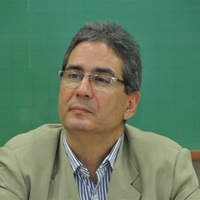


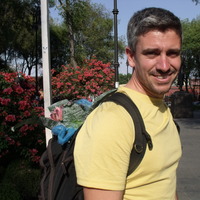







Uploads
Papers by Gustavo Lins Ribeiro